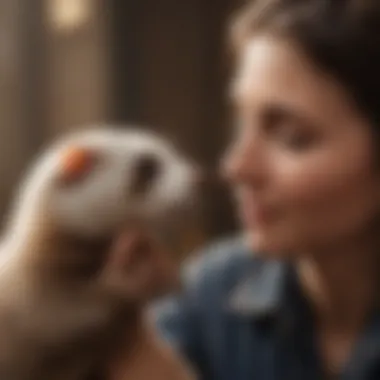Acquiring a Pet Ferret: Your Complete Guide to Ferret Ownership


Intro
Acquiring a pet ferret requires careful consideration. Beyond the enthusiasm, it means preparing for a unique animal that has specific needs. This guide serves as a resource to understand the process involved in adding a ferret to your household, whether you've owned pets before or are a first-time owner.
Before diving into specifics, it's essential to acknowledge that ferrets are curious, intelligent creatures. They can adapt to different living situations but require dedication to thrive. Proper information ensures you make informed decisions fitting for both your lifestyle and your new pet.
We will explore the various sources for obtaining ferrets, whether through purchase or adoption. Additionally, the guide underscores the responsibilities you must fulfill as a ferret owner to care for these animals effectively.
Understanding the essence of becoming a pet ferret owner involves realizing the commitment required to ensure their health and happiness. With that framework in mind, let’s move on to discussing how you can properly prepare for bringing a ferret into your life.
Understanding the Appeal of Ferrets
Ferrets have become increasingly popular as pets due to their unique qualities and engaging personalities. Understanding the appeal of these small mammals is essential for anyone considering bringing one into their home. Unlike traditional pets, ferrets are often described as being curious, playful, and affectionate.
Characteristics of Ferrets
Ferrets possess several distinctive traits that contribute to their charm. Their slender, elongated bodies allow for agile movement, and they can be quite sociable with humans and other animals. They generally display lively behavior, often darting around and investigating their environment. Some key characteristics include:
- Curiosity: Ferrets love to explore and will often get into tight spots when searching for adventure.
- Playfulness: Their enthusiastic approach to play can amuse owners and draws them into interactive activities.
- Affectionate Nature: With consistent handling and gentle interactions, these animals can bond closely with their human companions.
These traits make ferrets attractive for pet owners who appreciate an active pet but also want companionship.
Companionship and Social Interaction
One of the most notable appeals of ferrets is their capacity for companionship and social interaction. Ferrets thrive in social settings; they benefit greatly from engagement with humans and can even play with other pets. Their playful antics can lighten the mood and keep their owners entertained.
Interaction is essential to ensuring a happy ferret. Here are a few aspects to note:
- Bonding with Owners: When ferrets form bonds with their owners, they often seek attention and enjoy physical closeness.
- Group Play: Ferrets are highly social and tend to enjoy the company of other ferrets. Having more than one ferret can enhance playtime, allowing for natural interactions.
- Understanding Behavior: They communicate their feelings through chirps, whispers, and even by nipping lightly. Owners who foster mutual respect and understanding can enjoy more fulfilling relationships with their ferrets.
Where to Find a Pet Ferret
Finding a pet ferret requires careful consideration of the source of acquisition. The method chosen affects various factors such as health, temperament, and overall compatibility with your lifestyle. Exploring different options can prepare future owners adequately. The sources include local pet stores, reputable breeders, and animal shelters or rescues. Each source presents unique benefits and potential drawbacks.
Local Pet Stores
Local pet stores may seem like a straightforward option for acquiring a ferret. They usually have ferrets readily available for sale. However, not all pet stores ensure humane breeding practices. It is key to consider the store's credibility when selecting this option. Visit the establishment, engage with the staff, and assess the conditions in which the ferrets are kept.
While some stores maintain healthy and well-cared-for pets, others might stock ferrets from dubious sources. Some advantages of shopping at pet stores include immediate availability and the opportunity to see the ferrets in person. You may positively interact with different animals, helping you choose one that fits you the best.
On the flip side, it is wise to clarify the health guarantees offered by the store. Ask about any warranties, vet checks, and return policies. Lack of such practices can lead to acquiring a poorly healthy pet.
Breeders
Engaging with reputable breeders is often considered a more responsible avenue for sourcing a ferret. Reliable breeders prioritize the health and breeding of their ferrets and are likely to provide additional support and information on care after the sale. When working with a breeder, you may have access to a wider selection of ferrets. This lets prospective owners find those of specific temperaments or lineage.
Another significant benefit of seeking a ferret from a breeder is the extensive knowledge they usually possess regarding the animals. Elite breeders verified by ferret associations or clubs ensure sound breeding ethics as they attend to their animals’ overall welfare. Be prepared to ask questions about their breeding practices and inquire about health screenings.
However, adopting a ferret from scintific breeders generally involves higher costs. Therefore, it’s important to ensure that the investment aligns with your budget. Keep in mind the potential costs for registration or essential vaccinations.
Animal Shelters and Rescues
Considering animal shelters and rescues presents a more commendable option for acquiring a ferret. This pathway might introduce you to a different side of ferret ownership, with many ferrets waiting for a second chance. Saving an animal from a shelter can also be an emotionally fulfilling choice, knowing you contributed toward alleviating pet overpopulation.


It is critical to note that while ferrets end up at shelters for several reasons, including abandonment or relinquishment due to lifestyle changes, the environment at these facilities should prove nurturing. Communication with shelter staff can reveal helpful insights into each ferret’s history and personality. Adoption fees at these facilities tend to be significantly lower than those from breeders or pet stores. Often, it may even cover spaying or neutering and first vaccinations.
Despite the advantages, adopting from a shelter may involve unpredictability in terms of temperament and health. It is crucial to thoroughly understand what you are getting into when choosing this route. Keeping a cautious outlook on a ferret's needs will ensure successful integration into your home.
In summary, sourcing a ferret involves several considerations. Time invested in these searches pays off in having a healthy relationship with your pet.
What to Consider Before Getting a Ferret
Acquiring a ferret is a multifaceted choice that extends beyond mere attraction to this playful animal. This section focuses on essential factors that must be deliberated for making that decision. Evaluating legal regulations, ensuring your lifestyle is compatible with ferret care, and understanding the cost implications form a triad of critical components that every potential ferret owner should consider.
Legal Regulations
Before committing to a pet ferret, it is crucial to be aware of the specific legal regulations that govern ferret ownership in your area. Laws vary significantly across regions. In some places, ferrets might be legal without restrictions, while others could have specific licensing requirements or outright bans.
Here are key points to consider regarding legal regulations:
- Local Laws: Always verify your local laws through government websites or local animal control networks.
- Bans: Certain states or cities may prohibit ferrets as pets. Delve into regulations specific to those locations to avoid potential fines or confiscation of your pet.
- Permits: Some areas require owners to obtain permits, falling under certain care standards that must be met.
Being well-informed about these facets can spare future distress and unnecessary complications in ferret ownership.
Lifestyle Compatibility
Ferrets are engaging creatures that require ample attention and a dedicated lifestyle. Assessing your personal schedule and lifestyle is paramount for a harmonious ferret and human coexistence.
- Time Commitment: Ferrets thrive in environments where they receive sufficient interaction. Be honest about the time you can allocate to play and exercise them, as well as feeding routines.
- Space Considerations: Ensure adequate space for a living environment. Ferrets need room for their habitats, along with feasible play areas where they can explore safely.
- Family Dynamics: Evaluate how ferrets interact with existing pets and family members. Make sure everyone in your household is prepared for a pet that brings high energy and playful mischief.
Knowing your lifestyle compatibility helps you mitigate challenges in nurturing your ferret, leading to an enriching companionship.
Cost of Ownership
Lastly, be prepared for the financial implications of adding a ferret to your family. Ferrets, while not as costly as some pets, do incur ongoing expenses that require careful planning.
- Initial Costs: These can include adoption fees, supplies for settings such as cages, bedding, toys, and feeding basics. Initial shelease checklists can mount expenses higher than anticipated.
- Ongoing Expenses: Like food, regular vet visits, and ongoing needs can accumulate. It is essential to factor in these recurring breeds of costs.
- Unexpected Costs: Always reserve budget for unforeseen events, like health-related concerns or sudden needs for more supplies.
Understanding the economic responsibility associated with ferret ownership prepares you for lasting commitment.
Preparing for a Ferret
Preparing for a ferret is a crucial step in becoming a responsible pet owner. . Before bringing a ferret into your home, understanding the various elements involved in setting up your life to accommodate this playful creature cannot be overstated. Ferrets have specific needs. An environment that enables them to thrive emotionally and physically is fundamental for long-term satisfaction.
Setting Up a Suitable Habitat
A suitable habitat is the centerpiece of any ferret owner’s preparations. Ferrets are naturally curious and active animals, demanding ample space to explore. It is advisable to choose a ferret cage that is tall with multiple levels. This design supports climbing, a natural behavior for ferrets, allowing them to engage in physical activity and reducing the chance of boredom.
The dimensions should ideally be 24 inches x 24 inches x 36 inches, yet larger spaces provide more comfort. Liners often offer easier cleanup. Ensure enough ventilation in the habitat, as poor airflow may cause health issues. Seasonal variations in temperature also require monitoring as ferrets are sensitive to temperature extremes, both hot and cold. Providing soft bedding materials is necessary because it keeps ferrets cozy while allowing for nesting instincts to manifest.
Animal-safe toys and tunnels give them mental stimulation, essential for their overall wellbeing.
Essential Supplies and Equipment
A well-equipped owner creates an inviting environment. You will at a minimum need food and water bowls, preferably stainless steel, due to their durability and ease of cleaning. Look for nutritionally balanced ferret food. Browse options that highlight high protein content, which is essential for a ferret's health. Consulting a vet for diet recommendations should not be overlooked.
A litter box with litter that is suitable for their sensitive paws is also necessary. Ferrets are relatively clean despite their playful tendencies. Moreover, create a safe space within your home where they can play without hazards. Setting up barriers and removing dangerous items is important in these spaces. Invest in a harness or leash. Their energy levels mean outdoor exploration may not always be safe or appropriate without one.


Important items include:
- Food and water bowls
- Ferret food
- Litter box and appropriate litter
- Comfortable bedding
- Secure cage or habitat
- Safe toys
Creating a Safe Environment
Safety is a top concern when preparing for a ferret. They are masters at finding hidden hazards and can squeeze into problematic spots. Begin by inspecting your home. Ensure that cords, small objects, chemicals, and non-ferret-safe indoor plants are out of their reach. Completing a safety audit is essential.
It is with great importance that you maintain an escape-proof environment. Ferrets are skilled climbers and diggers, so check every enclosure thoroughly. Sealing gaps in fences, walls, or across furniture is another effective method to avoid harmful outings.
In homes that also have other pets, gradual introductions and supervision remain critical. Some animals, particularly smaller pets, may be more vulnerable. Managing the environment and ensuring all interaction is positive sets the stage for healthy relationships. You will minimize their stress as you foster environments where ferrets feel secure and welcomed.
Creating a suitable habitat while prioritizing safety can drastically improve your and your ferret's living experiences.
Understanding these aspects before your new companion arrives is vital. Careful preparation shows dedication and fosters immediate feelings of security for your ferret. Proper planning supports the emotional bond between you and your pet.
Adopting vs.
Buying a Ferret
Choosing between adopting a ferret and purchasing one from a breeder is a significant decision. Each option presents different implications for both the ferret and the owner, and knowing these details can guide prospective ferret guardians toward making an informed choice. Understanding these differences also allows you to reflect on your values and priorities when bringing a ferret into your life.
When considering each option, it is crucial to evaluate various elements including costs, the potential for finding a pet in need of a home, and your specific preferences regarding breed and temperaments. Prioritizing the welfare of the animal should remain central to your decision-making process.
Advantages of Adoption
Adopting a ferret carries numerous benefits that often go beyond financial savings. Here are some important reasons to consider adoption:
- Saving a Life: When you adopt, you give a ferret a chance at a loving home. Many ferrets in shelters are abandoned or surrendered, and taking one home reduces the burden on these facilities.
- Lower Initial Costs: Adoption fees are usually lower than breeder prices. The fee often includes spaying or neutering and initial vaccinations, making it cost-effective.
- Already Socialized: Many ferrets in shelters have experienced varying degrees of social exposure. This can sometimes mean they are already accustomed to human interaction, easing the transition into their new home.
- Diversity of Options: Shelters often have a variety of ferrets with different personalities and ages. This allows you to choose a pet that fits your lifestyle best.
However, it is crucial to recognize that not all shelter ferrets come with the same temperament or health status, so diligence in reviewing each ferret’s background is important. It's also possible that they may require additional acclimatization time as they adjust to their new environment.
Pros of Purchasing from a Breeder
Opting to buy a ferret from a breeder presents its own set of advantages that can align more closely with certain preferences:
- Predictability: Responsible breeders often specialize in specific breeds. This allows potential owners to predict the physical characteristics and behavioria of the ferrets more accurately.
- Health Guarantees: Breeders typically provide healthcare documentation, which may include vaccination records, and a guarantee against genetic health conditions. This could alleviate some concern about unexpected veterinary expenses.
- Early Socialization: Many reputable breeders start socializing their kits at a young age, encouraging a more confident and friendly disposition from the outset.
- Support and Guidance: Buying from a knowledgeable breeder can facilitate educational support. They can provide thorough advice about species-specific care, nutrition, and training for your new ferret.
Despite these benefits, it is important to emphasize that not all breeders maintain ethical standards. Verification of a breeder’s authenticity through references and feedback is essential to ensure the well-being of both the pet and the prospective owner.
"Deciding whether to adopt or buy is not merely a question of price but rather one of values and commitment to animal welfare."
The Importance of Socialization
Socialization is a crucial aspect of ferret care that cannot be overlooked. Ferrets are naturally social creatures, often showing playful and curious traits. Proper socialization contributes to their emotional well-being, making ferrets more affectionate, playful, and at ease in various environments. A well-socialized ferret is less likely to exhibit behaviors such as biting or fearfulness. This brings harmony to both the ferret’s life and the owner's experience.
Interaction with Humans and Other Pets
Bonding with humans is essential for ferrets. Ferrets thrive on interaction with their owners. Spending time together enriches their lives and speeds up the process of trust-building. Engaging with them daily helps your ferret become familiar with your presence and routines, allowing it to feel safe and secure. This can involve simple actions like playing, grooming, or just sitting nearby.
However, introduction to other pets should be handled with care and awareness. Ferrets can display territorial behavior or fear toward new animals. To ensure a smooth introduction:
- Supervise all early interactions.
- Create a safe zone. Ensure each animal has a comfortable area to retreat to.
- Observe body language. Knowing the signs of stress in both ferret and the other pet aids in preventing conflicts.


Taking these steps will cultivate a friendlier household where all pets can coexist peacefully.
Training Tips for Your Ferret
Training a ferret, while challenging, brings many rewards. Ferrets are intelligent but can be stubborn. Implementing positive reinforcement techniques is the key. Rewarding desired behaviors strengthens their likelihood to repeat those behaviors.
Here are some useful tips for training your ferret:
- Start with simple commands. Teach commands like “come” or “sit” using treats as rewards.
- Be consistent. Regular practice helps reinforce what the ferret learns and fosters understanding of the training sessions.
- Keep sessions short. Ferrets have short attention spans, so brief training sessions will be more effective.
Training not only develops skills but also enhances the bond you share with your ferret. Hence, it adds structure to their day while facilitating their adaptation to varied situations.
Positive interactions and training contribute to a happier life for your ferret.
In summary, socialization paves the way for bringing home a well-adjusted ferret. It promotes greater connections with humans and pets, resulting in more manageable behavior and a loving environment. Plus, investing time in effective training accelerates this process significantly.
Common Misconceptions about Ferrets
Understanding common misconceptions about ferrets is crucial for potential pet owners. Misconceptions can lead to poor decisions and inadequate care. Since ferrets share similarities with both domesticated animals and wild species, this can cause some confusion. It is vital to dispel inaccurate beliefs to ensure that ferret ownership is approached with the right mindset and knowledge.
Ferrets as 'Wild' Animals
One of the most common misconceptions is viewing ferrets as wild animals. This is largely due to their ancestry, derived from the European polecat. While ferrets belong to the weasel family, they have been domesticated for thousands of years. Unlike their wild counterparts, domesticated ferrets exhibit behaviors that are specific to living with humans. They are social creatures that thrive in a structured environment alongside people.
It's essential to recognize that ferrets require companionship and human interaction. They do not behave like traditional pets such as cats and dogs. This means they need a different level of engagement and understanding from their owners. Some people mistakenly believe that ferrets can be left alone for extended periods like cats; however, this does not account for their social nature. Ignoring their social and interactive needs can lead to behavioral issues and even stress.
Moreover, potential owners often think that because ferrets are small, they do not need as much care. However, they have specific needs regarding diet, environment, and enrichment.
Health Risks and Care Requirements
Another misconception revolves around the health risks associated with ferrets and their actual care requirements. Ferrets are often seen as prone to disease and have complex health needs. While it is true that they can be susceptible to certain medical issues, it is largely manageable with regular veterinary care and proper living conditions.
Ferrets typically require a specialized diet rich in protein and low in carbohydrates to thrive. This can often be overlooked, with new ferret owners not recognizing the importance of quality ferret food. Nutritional deficiencies can lead to serious health problems over time.
Regular veterinary check-ups play a crucial role in maintaining a ferret's health. Ferrets should receive vaccines, routine examinations, and any necessary treatments as part of their care. The misconception that ferrets do not require significant medical intervention can result in neglect ultimately affecting their well-being.
Finally, potential ferret owners frequently underestimate the time and effort needed to care for these animals. Ferrets need mental and physical stimulation through playtime and socializing. Lack of attention can cause behavior problems, such as biting or digging. Understanding their comprehensive care requirements is essential for a successful and fulfilling relationship.
A well-informed owner leads to a happy and healthy ferret. Knowing the truth behind ferret care dispels doubts and enables responsible pet ownership, fostering a positive relationship between the pet and its owner.
Misconceptions about ferrets can deter informed decision-making. By clarifying these misunderstandings, future owners will be better equipped to provide joyous and fulfilling experiences for both themselves and their ferrets.
The End
The conclusion of this article brings focus on the vital elements related to ferret ownership. As prospective owners, one must realize the commitment and dedication needed for properly caring for these small yet vibrant creatures. Ferrets require specific habitats, social interactions, and health considerations that are unique to them.
Final thoughts regarding ferret ownership revolve around understanding their jealousy, curiosities, and strong instincts. Proper training and socialization shape a ferret's temperament. Making an informed decision about obtaining one is crucial. Ignorance can lead to frustrating outcomes for both owner and pet. The responsibilities associated with ferret care entail observing their dietary needs, ensuring regular veterinary checkups, and providing mental stimulation through toys and social interactions.
Being aware of their innate behaviors can also assist in avoiding potential pitfalls. Well-informed owners can enjoy long-lasting, fulfilling companionship. Recognizing legal regulations or restrictions in ferret ownership can avoid future hassles.
As you deliberate nurturing a ferret, let your decision stem from attentiveness about their charms as well as their challenges. They require not just a space to live, but an owner committed to them as individuals.
"Owning a ferret is not just about having a unique pet; it is a relationship that invokes understanding and respect for another life."
Overall, achieving balance between providing care and enjoying ferret antics enriches life. Ferrets can surprise you with their intelligence and reflection of personality. Thus learning about their needs encourages developers capacity of bonding and responsibility. Deeply considering becoming a ferret owner is rewarding, provided the spirit of community and care thrives throughout the relationship.
Final Thoughts on Ferret Ownership
In summary, taking on a ferret host both joy and an obligation. Recognizing this intertwining aspect leads to having a deeper appreciation for them. Surveys reveal that many ferret owners find a unique bond with their pets that fosters affection and a social understanding among them. Preparing oneself allows you to provide strategies for enhancing their quality of life.
Potential owners should develop various skills while nurturing those cute yet rambunctious creatures. Education supports courage toward engaging interactions with ferrets. Resources such as www.britannica.com provide clarity on the specifics around ferrets. Joining communities on platforms like www.reddit.com can support interactions with experienced owners, giving invaluable advice. Thus, thoughtful planning leads to a lasting relationship full of harmonies and delightful experiences.















